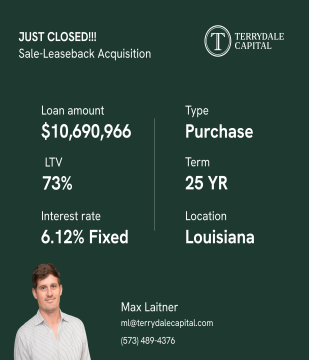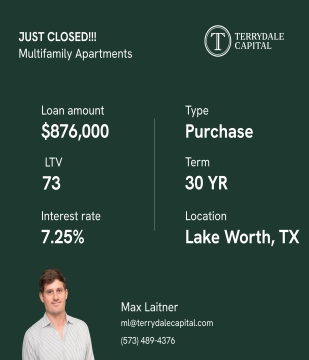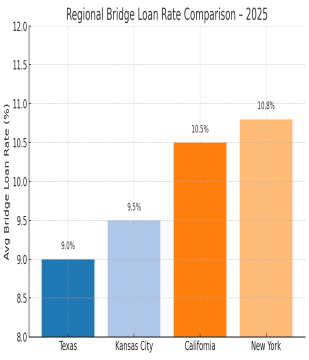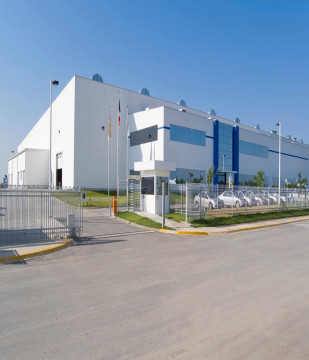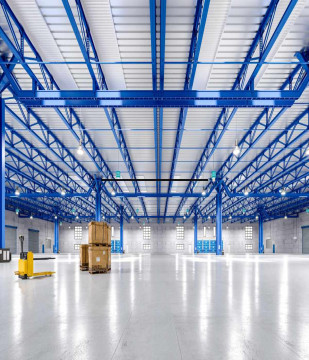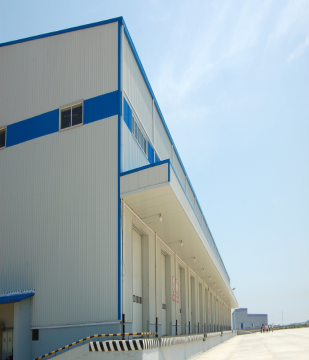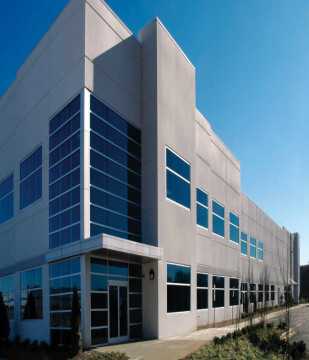Commercial Financing vs. Residential Financing

Terrydale Capital
Oct 6, 2022 14 Min read
 Learn
Learn
Are you planning on investing in commercial real estate? You’ll quickly discover that commercial financing options differ significantly from residential financing. The loan you may have used for your mortgage is relatively simple and direct, but commercial financing can come in various forms.
This guide will help you understand the key differences between commercial financing vs. residential financing to prepare you for your investment journey.
Who Needs Commercial Financing?
Residential financing is used for a property that you plan to live in. Commercial financing is a bit broader and used for any property you use to earn revenue. This can include anything ranging from:
- Apartment buildings
- Self-storage
- Retail space
- Office space
- A service-oriented business
- Warehousing
- Manufacturing centers
- Rental property
No matter your investment goals, you’ll need commercial financing to achieve them.
Do I Need Commercial Financing for an Investment Property?
Some investment properties may be small. For instance, you might purchase a home to use as a vacation rental or a small house that you convert into apartment subunits. Generally, you can rely on a conventional mortgage to make this happen.
However, residential loans can only be used for properties of four residential units or less. Any larger, and you’ll need to obtain commercial financing for a larger apartment building. The same is true for larger structures such as warehouses, shopping centers, and more.
Additionally, if you already have 10 residential loans on other properties (including your home), you no longer qualify for additional residential financing. Instead, you’ll need to switch to commercial financing for all future properties, regardless of size.
Commercial Financing vs. Residential Financing: Key Differences
There are many critical differences between commercial financing and residential financing, some of which you may not have considered if you’re only familiar with the traditional mortgage process.
Here are some of the main distinctions between commercial and residential financing.
Loan Source
Typically, you can secure a residential loan from just about any major bank or nationwide mortgage lender. Shopping around helps you secure the best rates and terms. Terrydale Capital specializes in arranging loans for investors and has relationships with over 1,000 lending partners.
Interest Rates
Commercial loan interest rates can vary depending on many factors, including the type of loan, the amount, and personal financial history. But despite this variation, they tend to have higher interest rates compared to residential loans.
The exception to this rule may be found in loans that have a shorter loan term, but it’s not always in your best interests to pursue a shorter amortization period, nor will every lender offer this feature.
Amortization Period
Amortization refers to the length of the loan. Most people are familiar with the traditional 30-year mortgage that comes from a residential loan. The amortization period on a commercial loan is often shorter, mainly because this reduces risk to the lender.
At Terrydale Capital, for example, we offer loans with 30-year amortization schedules, as well as having 5, 7, and 10-year terms. Be advised, however, that these terms can vary based on the specific type of commercial loan, and your eligibility can vary based on your financial background.
Qualifications
When you apply for a residential loan, your lender will primarily scrutinize your assets, including your income, savings, and credit history.
With a commercial loan, lenders will look at these features, but they will mainly be concerned about the asset’s performance. For this reason, commercial real estate lenders will rely on careful metrics to assess the commercial property's value before approving the loan.
Basically, commercial lenders may perform some basic business valuation techniques to determine the relative value of the property in question. This is important since it tells lenders how much risk is involved. In other words, how easily you’ll be able to repay the loan.
Before you invest, you’ll want to ensure that you have a clean borrower profile and a thorough understanding of the property’s potential performance to improve your odds of qualifying for a commercial loan. Terrydale Capital goes through this qualification process prior to sending out your loan in order to save you time and money.
Down Payments
Most homebuyers are familiar with the traditional 20% down payment, though many residential loans are available for as little as 3% down. Some residential lending programs (USDA loans, VA loans) are available for no money down for qualifying homebuyers.
Commercial financing has a much higher down payment requirement. Most lenders require a downpayment of 20% to 30% depending on the type of loan. And even these loans can be influenced by the condition and financial performance of the property in question, which means that investors will have to make a significant investment to purchase a commercial property.
Fixed vs. Variable Interest Rates
Most traditional residential loans offer fixed rates over their 30-year term. By contrast, commercial loans can often have variable interest rates, which can greatly affect the cost of the loan if the rates fluctuate sharply.
To be fair, these are generalities, and just as some home loans can use variable interest rates, some commercial loans can have a fixed interest rate. As you explore commercial financing options, make sure to evaluate which loan programs offer fixed vs. variable interest rates
Prepayment Penalties
Homeowners have the option to prepay their residential mortgage with no penalty. For example, homeowners might make extra mortgage payments to pay their loan down early, thus saving on interest payments in the long term.
On the other hand, commercial loans generally have some prepayment penalties. These penalties are based on the loan type and can vary based on the method by which the loan is paid. For example, commercial mortgage-backed security loans have a different prepayment penalty when you pay the loan in a lump sum (known as yield maintenance) compared to replacing the loan with a government bond (defeasance).
When you secure the loan, it’s important to understand the penalties associated with your loan, as well as the varied penalties that apply within its structure.
How to Prepare for Commercial Financing
As you can see, the purchasing process for a commercial property is a bit more involved than for a typical residential property. For this reason, it’s important that you take the necessary steps to ensure you’re ready for the financial commitment of commercial real estate investing. Here are some general tips to help you prepare.
Assess Your Finances
For starters, do you have the financial stability to commit to a loan of this size and type? This means that you’ll need enough to make the comparatively large down payment, the cost of inspection, closing costs, and other fees.
You’ll also need to make sure you’re prepared to meet the repayment schedule set by the lender. Obviously, commercial investors are counting on the income from the business to help them meet these obligations, but it may be important to have enough savings to cover your expenses until your property is earning revenue at peak capacity.
Evaluate Your Return on Investment
This is huge. Your lender will be primarily concerned with the asset's financial performance, and your ability to pay your loan depends on its profitability.
You can perform a rough evaluation by subtracting your operating expenses (including your estimated loan payments) from your expected revenue. For example, if you have to jack up the rent on your apartment complex to make it work, you might not see a strong return on your investment.
Be Sure You Have Time to Commit
When you manage a property of any size, you’ll have to ensure you have the time and the resources to commit to maintaining it.
For apartment owners, you’ll have to invest time in screening potential tenants, collecting rent payments, and performing maintenance on the property and common spaces (parking lots, laundry facilities). The same is true for larger properties, which may require you to outsource certain tasks such as groundskeeping, maintenance, and more.
Granted, you might consider hiring a third-party property manager to handle these tasks for you, but that goes back to the return-on-investment question. Your strategy needs to ensure that your property remains profitable so that you can continue making payments to your lender.
How to Find the Best Commercial Loans
It’s important to understand the performance of the asset, what type of down payment to expect, what term length to aim for, and what types of prepayment penalties best suit your strategy. Contact Max Laitner at Terrydale Capital to help address all this and more.
Partner With Terrydale Capital for Your Debt Financing Needs
When it comes to debt financing, understanding the right timing, process, and options is crucial. At Terrydale Capital, we provide a comprehensive range of commercial loan solutions tailored to meet your business's unique needs.














